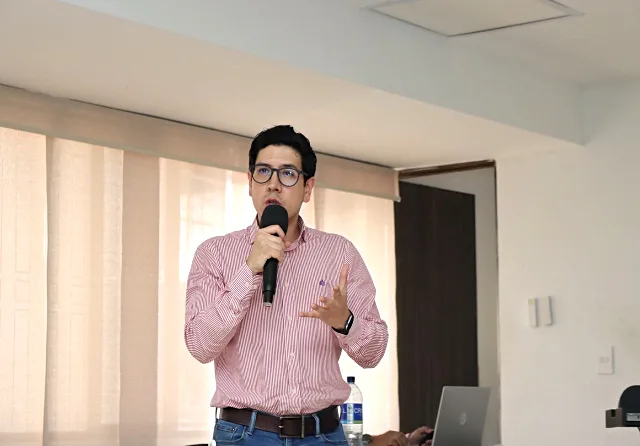Although the Ministry of Agriculture declared a national health emergency due to the “presence of the Streptococcus aglactiae ST7 Ia bacterium, in Huila tilapia farms”, the ICA and the Departmental Department of Agriculture and Mining announced that consuming fish from these farms “does not poses no danger to human health.
Diary of Huila, economy
By: Gloria Camargo
In an emphatic way, the Ministry of Agriculture, the Colombian Agricultural Institute and the Secretary of Agriculture of Huila, highlighted that the consumption of fish in crops where the presence of Streptococcus aglactiae ST7 Ia has been detected, does not register a risk or affectation in health human contact or consumption of tilapia.
Edison Javier Henao Palacios, General Secretary of the Department’s Fish Farming Chain, pointed out that, first of all, they have been working in an articulated manner with the institutions to deal with this emergency, and continue to provide a quality product to consumers.
Regarding the issue, the professional pointed out that a piece of peace of mind is provided “to all fish consumers, since there is no risk or danger in the consumption of this product in the face of the emergency that the fish farming sector is going through in the country.
The contingency is generated by a non-zoonotic bacterium, which does not produce any type of transmission by contact or by consumption, it is only a pathogen that is affecting fish cultures in all their stages of life, from larvae to animals to be carried. to the table”.
On the other hand, the ICA indicated that “it is important to highlight that the possibility of Streptococcus agalactiae ST7 serotype Ia affecting human health has not been demonstrated; therefore, contact with infected animals or consumption of tilapia does not generate any type of risk”.
Health emergency
Likewise, Henao Palacios, said that in Huila “all the actors in fish farming have been working hand in hand with the health authorities and other institutions to face this emergency promptly and forcefully.”
And he explained that “the peace of mind that we give to government institutions, producers, and other actors in the trade is that we can continue consuming fish without any problem. Today we are going through a difficulty in sanitary terms, but we have been working to shield the productive issue, so a national health emergency is declared due to the presence of this bacterium, but with the union of all the links in the industry, we are going to come out ahead of this contingency that Colombia is going through today.”
It should be remembered that according to Minagricultura, Resolution 6535 of June 7, 2023 and after verifying the presence of the Streptococcus aglactiae ST7 Ia bacterium, in Huila tilapia cultures, new outbreaks were confirmed in the departments of Atlántico, Tolima and Magdalena, due to what the Colombian Agricultural Institute declared a national health emergency.
“This declaration allows us to apply the sanitary measures that are necessary in any part of the country, based on the existing risk, aimed at controlling and reducing fish mortality, as well as protecting national fish farming and guaranteeing the country’s food security,” had indicated the Minister of Agriculture, Jhenifer Mojica.

Quality and safety
The General Secretary of the Fish Farming Chain, also explained that in the department, you can have the guarantee that “all the fish that is distributed for human consumption, complies with quality and safety standards, and that at no time are they sold animals attacked by the pathogen, as these have another final disposition.
All animals that show clinical signs in aquaculture establishments are slaughtered, and likewise dead animals are disposed of according to the protocols established by the authorities, either for the production of by-products, or incinerated and buried, so that the mortality caused by the bacteria will never reach the tables of Colombians at any time,” he said.
For this reason, the Colombian Federation of Aquaculture Farmers – Fedeacua, called on consumers to continue including this high-quality protein in food rations, noting that fish meat designated for distribution in supermarkets and other marketing areas, is innocuous, and that the disease caused by the pathogen is not transmissible to people.

Control measures
Finally, the ICA indicated that it is “working with the laboratories that produce veterinary biologicals in the development of autovaccines with strains isolated from the outbreaks detected in the country, as well as in the evaluation for the entry into Colombia of commercial vaccines against the bacterial agent that are registered in other countries”, this work is part of the control measures established in the declaration of emergency, which also includes specific serotype vaccination against this bacterium.
Likewise, it has been reported that visits to verify compliance with the biosafety standard continue to be carried out, due to its importance for the prevention and mitigation of the consequences generated by the presentation of the disease.
Hernán David Rubio, general director (e) of AUNAP, indicated that the entity is carrying out actions “to accompany fish farmers in this health emergency, through the formalization of small and subsistence producers, being the promotion program a strategy that allows working for the food security of them and their families”.
According to Roa, general manager in charge of ICA, to date, the entity has dealt with 29 cases in Huila, ten in Atlántico, three in Magdalena and one in Tolima. The Institute’s professionals have carried out timely and free sampling and diagnosis for producers in the affected regions.

“Mortality cases have occurred in all productive stages of tilapia: farming, fingerlings, rearing and fattening, with the following levels of affectation in each department: Tolima (10%), Huila (12%), Magdalena (37 %) and Atlántico (47%)”, said Roa.
